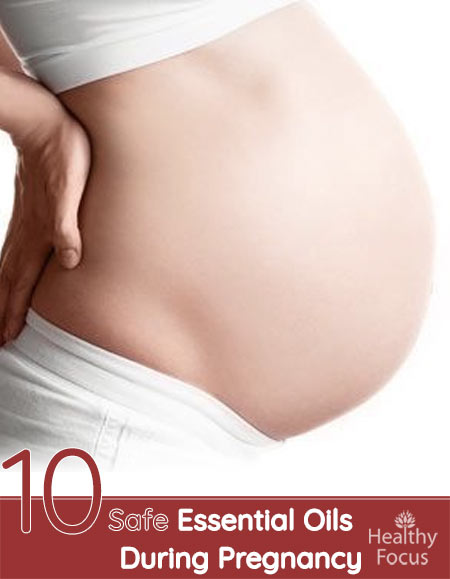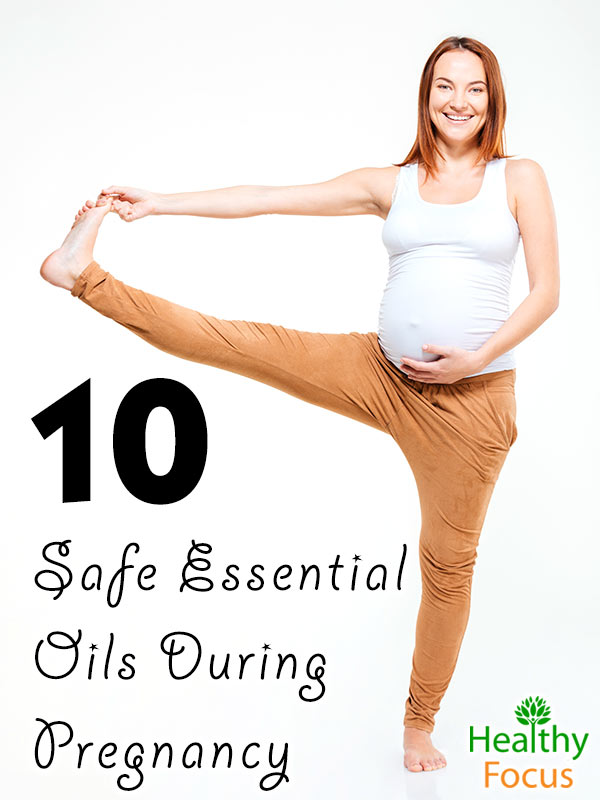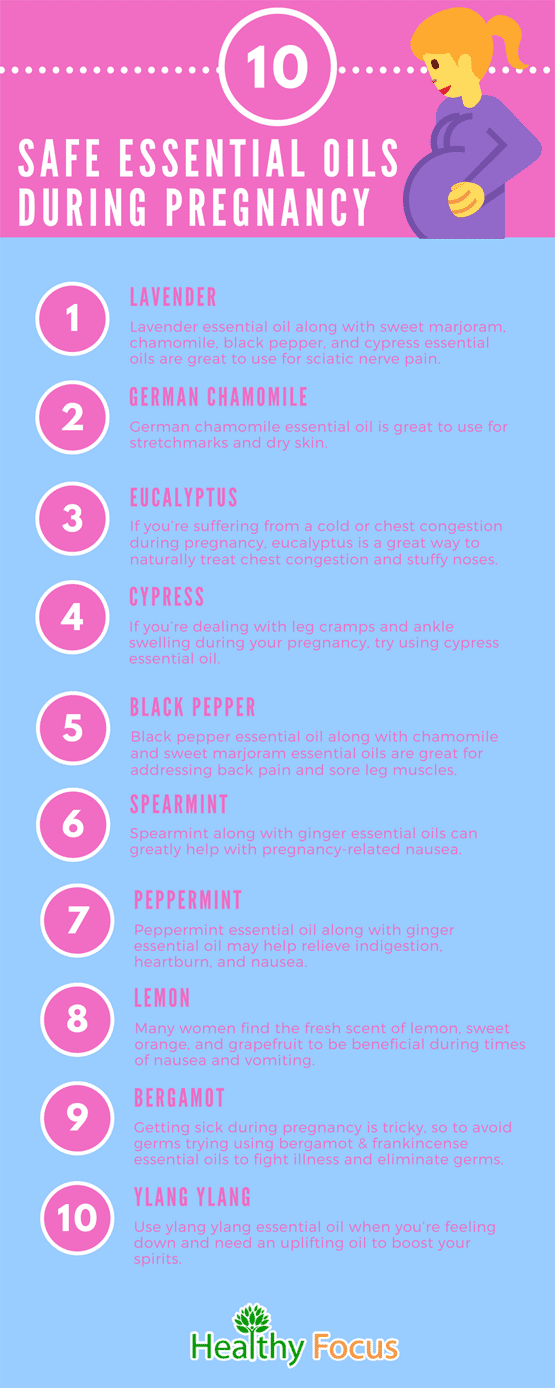Last Updated on September 10, 2019 by Marc Seward
Essential Oils and Pregnancy
Navigating the world of self-care can be tricky when you are expecting, especially when it comes to essential oils. Pregnant women know that when they are caring for two, they have to take extra caution with whatever they do, making sure that their medicinal and beauty practices are safe for the baby growing inside of them.
Using essential oils during pregnancy is safe as long as you practice extreme caution. Essential oils are the pure essence of flowers, tree, and plants and are quite powerful. When using essential oils during pregnancy, it is important to keep the following things in mind:
- Only use essential oils under the supervision of your physician.
- Do not ingest essential oils while pregnant or nursing.
- Essential oils are highly concentrated, so use them sparingly.
- When essential oils are massaged into your body, they are absorbed into the skin and work just like medicine. The molecules that make up the chemical makeup of essential oils are miniscule and may cross the barrier of your placenta. For this reason, it is important to only use essential oils that have been deemed safe for women during pregnancy and while nursing.
- It is not currently known how certain essential oils affect the baby and women during pregnancy, but it is best not to risk it, yeah?
- Only use essential oils from reputable sellers. When you are pregnant, it is important to know exactly what you are putting in your body, and unfortunately, essential oils sold at a discount price are often compromised with fillers, which can be harmful to both you and your baby.
- When diffusing essential oils in a vaporizer, only use a drop at a time.
- When diffusing essential oils, but only do so for 10 minutes at a time. Diffusing essential oils for a longer duration may cause nausea and headaches.
- Try to switch things up by not diffusing one particular kind of essential oil every day for weeks at a time. Try to only use essential oils when you need them, such as to treat nausea, leg cramps, insomnia, cough, indigestion, stress, anxiety, and insomnia.
- When using essential oils topically, always dilute them with a carrier oil. Always dilute one drop of essential oils with a teaspoon of a carrier oil before massaging it into your skin or adding it to your bath. Grape seed oil and sweet almond oil are great carrier oils to consider.
- It’s not recommended to use essential oils during the first trimester of pregnancy. During the first three months of pregnancy, women are at high risk for miscarriage. Once you are past the first trimester, talk to a physician and an experienced aromatherapist that can best assist you in choosing the right essential oils for you.
- Do not use essential oils during your labor. Also, do not add essential oils to your birthing pool, as oil and water do not mix and will rise to the surface. These essential oils may be irritating to your newborn baby, causing burns or other health concerns if your baby accidently ingests the essential oils.
Essential Oils that are Safe to Use During Pregnancy
If you are healthy and your pregnancy is going smoothly, using essential oils can be a wonderful addition to your health routine. Below are some essential oils deemed safe to use while you are expecting.
1) Lavender
Some women worry about using lavender during pregnancy because it is known to regulate menstruation, however, lavender essential oil is perfectly safe to use during pregnancy when used correctly. Lavender essential oil along with sweet marjoram, chamomile, black pepper, and cypress essential oils are great to use for sciatic nerve pain. Lavender is great to use as aromatherapy to treat anxiety and stress. If you’re suffering from insomnia, try diffusing lavender essential oil in your bedroom. Keeping a drop of lavender essential oil in a personal inhaler by your bed is also effective.
2) German Chamomile
German chamomile essential oil is great to use for stretchmarks and dry skin.
3) Eucalyptus
If you’re suffering from a cold or chest congestion during pregnancy, eucalyptus is a great way to naturally treat chest congestion and stuffy noses. Other essential oils great for congestion and pregnancy safe are: fir needle and cypress.
4) Cypress
If you’re dealing with leg cramps and ankle swelling during your pregnancy, try using cypress essential oil.
5) Black Pepper
Black pepper essential oil along with chamomile and sweet marjoram essential oils are great for addressing back pain and sore leg muscles.
6) Spearmint
Spearmint along with ginger essential oils can greatly help with pregnancy-related nausea. Trying using these essential oils in a personal inhaler to get immediate relief. Spearmint is also a great way to treat fatigue that is oh so common in pregnancy. Diffusing some peppermint essential oil or lemon, lime, citrus, grapefruit, and sweet orange essential oils can give you a quick zip of energy. Diffuse these essential oils separately or create your own effervescent blend.
7) Peppermint
Peppermint essential oil along with ginger essential oil may help relieve indigestion, heartburn, and nausea.
8) Lemon
Many women find the fresh scent of lemon, sweet orange, and grapefruit to be beneficial during times of nausea and vomiting.
9) Bergamot
Getting sick during pregnancy is tricky, so to avoid germs trying using bergamot and frankincense essential oils to fight illness and eliminate germs. These two essential oils are also great for treating chest congestion as well.
10) Ylang Ylang
Use ylang ylang essential oil when you’re feeling down and need an uplifting oil to boost your spirits. Other essential oils great to use for a quick mood boost are geranium, lavender, chamomile, and citrusy scents.
Essential Oils to Stay Away from During Pregnancy
The following essential oils have been deemed unsafe to use during pregnancy.
Jasmine
Jasmine oil may jump start your contractions.
Clary Sage
Clary sage may also trigger contractions. This may be tempting for women who are overdue and ready to have their baby, however, it is too risky to use without the supervision of a midwife or physician.
Rosemary
Rosemary may increase blood pressure and may cause contractions.
Juniper
Juniper essential oil may have a detrimental effect on your kidneys during pregnancy.
Nutmeg
Using nutmeg essential oil may interact with pain-relieving drugs used during labor, having a hallucinogenic effect.
Sage
Sage essential oil may cause bleeding in the uterus.
Rose
Rose essential oil is also thought to have a negative effect on the womb, causing bleeding in the uterus.
Basil
Using basil essential oil during pregnancy may cause abnormal cell development in the fetus.
Other Essential Oils to Avoid While Pregnant:
Citronella
Cinnamon Leaf
Angelica
Thyme
Laurel
Cumin
Aniseed
Hyssop
Fennel
Wintergreen
When Not to Use Essential Oils
In some circumstance, essential oils shouldn’t be used at all during pregnancy for some women. If you fall under the following criteria, its best to avoid essential oils at all costs during your pregnancy:
- You have previously had a miscarriage
- You’ve experienced vaginal bleeding during your pregnancy
- You have a history of heart problems
- You are epileptic
- You have the following medical conditions: diabetes, kidney disease, thyroid issues, and problems with blood clotting
If you are unsure if using essential oils are right for you during pregnancy, speak with a physician or just avoid them all together until you are no longer pregnant and nursing.
[ratings]



Leave a Reply
You must be logged in to post a comment.